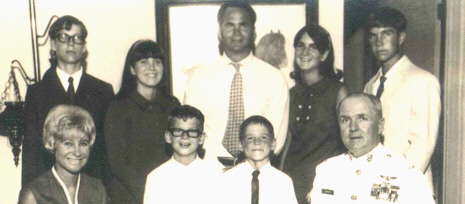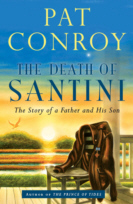

- Certain members of the Conroy clan viewed Pat’s writings as a betrayal of the family, exposing their dirty laundry to the public and tarnishing their reputation. Do you agree? How would you react if someone close to you novelized your life?
- How do you think the real-life Conroys compare to their fictional counterparts in the Meecham family?
- Conroy describes the lessons about love that he learned from his parents’ marriage in startlingly vivid terms, writing: “[love] was a country bristling with fishhooks hung at eye level, man-traps, and poisoned baits. It could hurl toward you at breakneck speed or let you dangle over a web spun by a brown recluse spider.” How do you evaluate this assessment of love and marriage? Do you think Conroy’s attitude shifts at all throughout the book? How did the example of his parents’ relationship influence his own marriages?
- Conroy writes of his “high contempt” for literary critics, claiming that “no writer has suffered over morning coffee because of the savagery of my review of his or her latest book, and no one ever will.” How do you reconcile this attitude toward literary critics with the suffering his writing caused the members of his family? Do the two positions contradict each other, or are they compatible? Why?
- In the introduction to this book, Conroy claims that other writers often consider autobiographical fiction to be a low form of literature. What do you think of this claim?
- Conroy writes “I don’t believe in happy families,” going on to explain that “A family is too frail a vessel to contain the risks of all the warring impulses expressed when such a group meets on common ground.” Do you agree with this claim? Is there such a thing as a happy family?
- Conroy describes his mother as playing the part of Scarlett O’Hara throughout her life. What part does Conroy play? Do we all play a role different from who we really are? If so, what part do you play?
- Conroy sometimes describes his parents and childhood in mythic terms, comparing his father to Thor and the Greek God of War. Is it human nature to make myths of our childhoods and deify our parents? What myths exist in your family lore?
- The Death of Santini explores the impact of Conroy’s Southern and Irish heritage on his upbringing. Discuss the importance of family heritage and ancestry in Conroy’s life and in your own.
- Conroy eloquently writes that “Your birthplace is your destiny” (pg. 100). What do you think of this statement?
- The Conroy children sometimes have very divergent perspectives on their shared childhood memories. What do you think of this phenomenon? Can you think of similar instances in your own life? Is it possible to avoid editorializing memories?
- In a much-discussed scene from The Great Santini, Bull Meecham’s son chases his father around the Beauford green yelling “I love you!” Why do you think Bull/Dan runs away from this onslaught of affection?
- Peg stuck with her marriage to Dan through some terrible times, yet the marriage could not survive the publication of The Great Santini. Why do you think that is? In what ways did the filming of The Great Santini change Pat’s relationship with his father?
- Conroy experiences the rare pleasure of watching his novel come to life on the silver screen. Who would play you in the movie of your life?